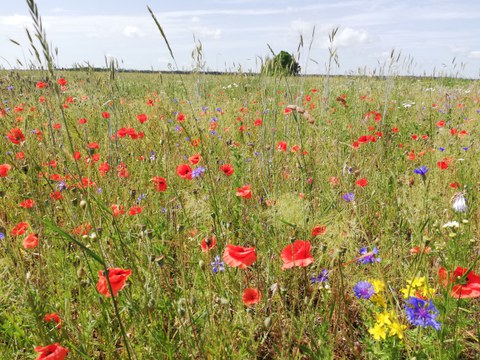06.12.2021
Bereichsübergreifendes Forschungsprojekt im Rahmen der BMBF-Forschungsinitiative zum Erhalt der Artenvielfalt zur Förderung ausgewählt

Blühstreifen in der Modellregion Vereinigte Mulde - Nordwestsachsen
Das von der Professur für Modellbasierte Landschaftsökologie (Fakultät Umweltwissenschaften) koordinierte bereichsübergreifende und transdisziplinäre Forschungsprojekt „Co-Design ökologisch und ökonomisch effizienter Politikinstrumente und Maßnahmen zur Erhaltung von Biodiversität und Ökosystemleistungen in Kulturlandschaften“ (Akronym: ECO²SCAPE) wurde nach einer einjährigen vorbereitenden Förderphase nun zusammen mit 16 weiteren Projekten in der Fördermaßnahme „Wertschätzung und Sicherung von Biodiversität in Politik, Wirtschaft und Gesellschaft“ (kurz: „BiodiWert“) der BMBF-Forschungsinitiative zum Erhalt der Artenvielfalt (FEdA) zur Förderung ausgewählt.
Das ECO²SCAPE-Konsortium wird von Prof. Dr. Anna Cord, Inhaberin der Professur für Modellbasierte Landschaftsökologie, wissenschaftlich koordiniert. Auch Prof. Björn Andres, Inhaber der Professur Maschinelles Lernen für Computer Vision, sowie weitere Expert*innen der TU Dresden mit einem fachlichen Hintergrund in Biogeographie, Umweltwissenschaften, Politikwissenschaft und Informatik sind Mitglieder des Projektteams. Externe Projektpartner sind die Brandenburgische Technische Universität Cottbus-Senftenberg, das Leibniz-Zentrum für Agrarlandschaftsforschung e.V., der Landschaftspflegeverband Nordwestsachsen e.V. sowie Nationale Naturlandschaften e.V.
Der Verlust an Biodiversität schreitet mit großer Geschwindigkeit voran – mit hohen gesellschaftlichen Folgekosten: Biodiversität ist die Grundlage für verschiedene Ökosystemleistungen und somit essentiell für das menschliche Wohlergehen. Die Intensivierung der Landwirtschaft gilt dabei als einer der wichtigsten Treiber des Biodiversitätsrückgangs in Deutschland. Trotz einiger Teilerfolge fehlt es an einer breiten Umsetzung von Maßnahmen zum Schutz von Biodiversität. Hier setzt ECO²SCAPE an: Im Projekt werden in der Modellregion „Vereinigte Mulde“ bei Leipzig neue, praxisnahe Ansätze und Maßnahmen zum Erhalt von Biodiversität und Ökosystemleistungen gemeinsam mit Landwirt*innen entwickelt, in die pilothafte Umsetzung gebracht und mit einem interdisziplinären Team wissenschaftlich begleitet. Ziel ist es, ökologisch wirksame und ökonomisch effiziente Maßnahmen zu gestalten, welche gleichzeitig auf eine möglichst breite Akzeptanz bei den Landwirt*innen und in der Gesellschaft abzielen. Mittels neu entwickelter Monitoringmethoden, u.a. auf Basis des maschinellen Lernens, werden diese nicht nur bzgl. ihrer Wirkung auf konkreten Flächen sondern auf Landschaftsebene untersucht. Der zugrundeliegende Forschungsansatz vereint innovative Methoden aus den Bereichen künstliche Intelligenz, institutionenökonomische Instrumentenanalyse, Umweltökonomie, ökologisch-ökonomische Modellierung und Softwareentwicklung. Das ECO²SCAPE-Konsortium wird mit insgesamt 2 Millionen Euro für drei Jahre (Oktober 2021 bis September 2024) finanziert.
Kontakt: Prof. Dr. Anna Cord, Professur für Modellbasierte Landschaftsökologie
